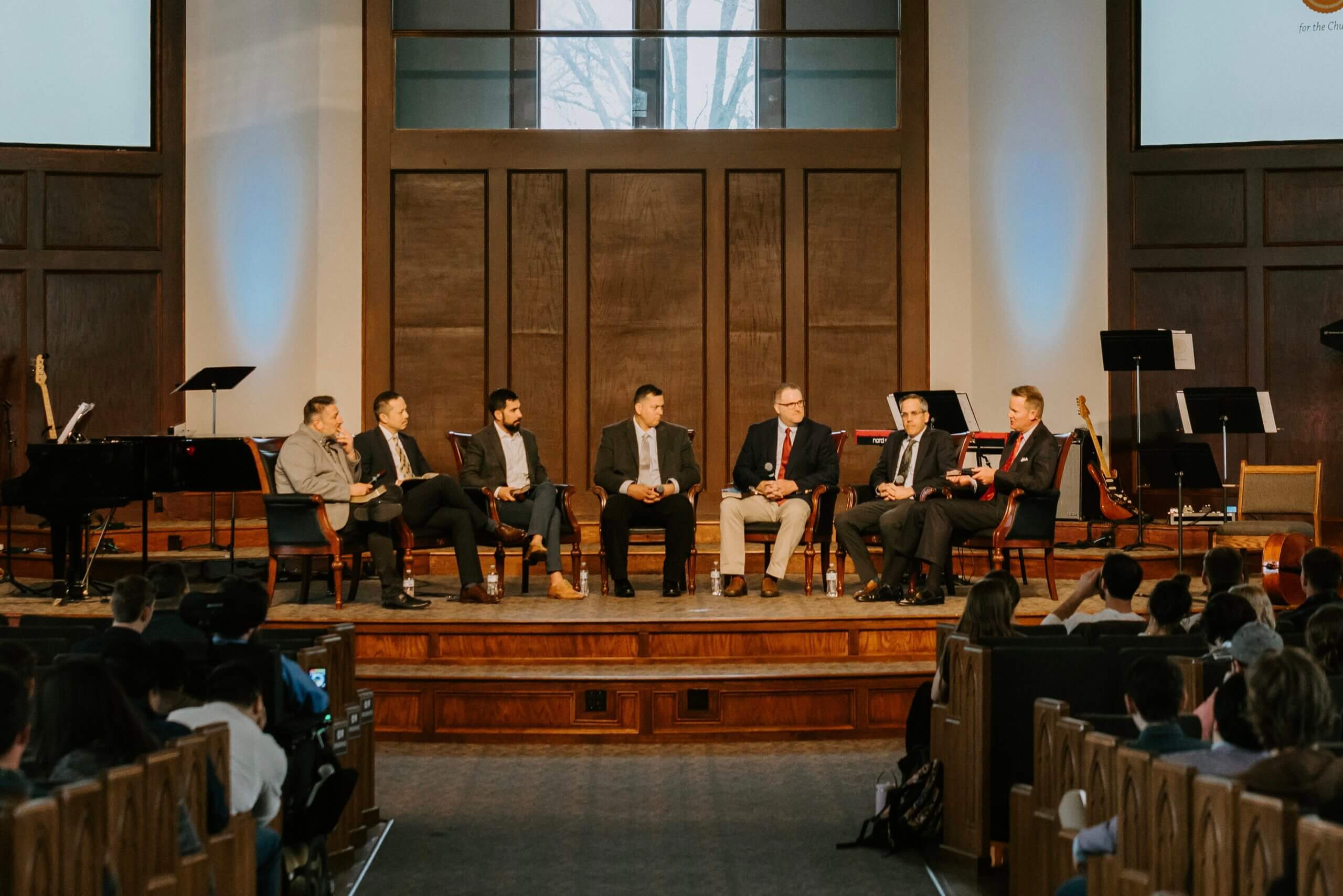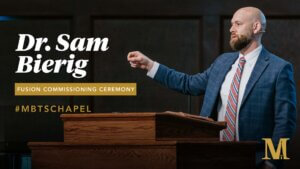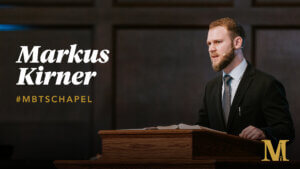KANSAS CITY, Mo—Midwestern Seminary welcomed Justin Taylor and Denny Burk to chapel on April 1 for a panel discussion on technology and ecclesiology. The conversation considered biblical wisdom for the use of artificial intelligence in ministry, the consumption of recorded sermons, and the rise of online church venues.
Taylor, who serves as executive vice president for book publishing at Crossway, and Burk, who serves as professor of biblical studies at Boyce College, were joined by Midwestern Seminary President Jason Allen and professors Jason Duesing, Patrick Schreiner, Geoff Chang, and Jared Wilson.
Introducing the panelists, Allen said, “These are very gifted, capable, and accomplished brothers, all faithful ministers of the gospel in local churches in addition to having instructional, writing, and publishing ministries.”
Allen opened the conversation with a discussion on the use of AI for sermon preparation. Panelists noted several problems with this practice, including the risk of plagiarism. Reflecting on the formative and shepherding aspects of working through a biblical text to prepare a sermon, panelists also cautioned that AI’s priorities of efficiency and productivity can work against these God-ordained processes.
Schreiner, who serves as associate professor of New Testament and biblical theology, noted, “The formation of a person is a process, which sometimes means slowing down and falling in love with meditative and contemplative work, where you are letting the Word of God seep into your soul and you are thinking about your congregation or those you’re speaking to, considering, ‘How does this apply to them?’”
He added, “AI can’t shepherd your congregation. The call is to shepherd a congregation.”
The conversation then turned to consider the wisdom of listening to recorded sermons and other spiritual content online. Panelists affirmed the value of biblical content while addressing the importance of active attention to God’s Word and the priority of hearing it alongside His gathered people.
“If you are listening to a recorded sermon, you get good content, and that’s good. There’s nothing wrong with that. But is that sufficient?” Taylor asked. He reflected on the possibility of sharing constructive feedback with a pastor after a sermon, which is uniquely done in the context of listening to preaching in person. “There is something about being in the presence of the pastor, knowing him, having him look at you, and knowing the context in which he’s preaching the Word,” Taylor said.
Wilson, who serves as assistant professor of pastoral ministry, pointed to the importance of showing honor for God’s Word, saying, “If our normative use of sermon reception is scrolling through our phones, it doesn’t have the same reverence for God’s Word as the regular gathering of God’s people to hear the preached Word from an ‘incarnate’ presence who is bringing that Word.”
The conversation then narrowed to focus on the practice of replacing gathered church fellowship with online content or video venues. Panelists reflected on the biblical word church, meaning “assembly,” and noted the spiritual benefit of embodied fellowship.
Taylor highlighted that gathering with other believers is a necessary aspect of giving encouragement to one another. Likewise, Schreiner pointed out that practical obedience to New Testament commands such as singing, baptizing, and taking the Lord’s Supper requires a physical gathering.
Burk noted the many ways Scripture refers to God’s people as a gathering in both the Old and New Testaments. “There’s this pattern set not just by tradition but reflected in Scripture, that the church, fundamentally, is the congregation of God’s people, meaning that we gather together.” He added, “If you’re not gathering, you’re not being a church.”
Duesing, who serves as provost of Midwestern Seminary, added that questioning the importance of the physical gathering is unique to Western Christians. “For the majority of believers around the world, you do not have to sell them on the value of gathering together,” he said. “It’s the highlight of their week. They need to do it. They need to gather, hear about God’s Word, and experience it together to go out and live their lives.”
To conclude the conversation, Allen asked panelists to “make the case for church membership.” They pointed to various biblical commands given to believers that assume a gathering, noting God’s grace given through fellowship and accountability with other believers.
Chang, who serves as assistant professor of Church history and historical theology, shared, “The Church is the display of God’s wisdom and glory to the watching angels and the universe. This only happens as Jew and Gentile, who have nothing in common except for Christ, come together and live together, committed to one another and loving one another.”
He went on to say, “You can have such a bigger vision of what God is up to in this universe by being part of a local church, so commit yourself to a church and be a part of that grand plan of displaying the glory of Christ to the world.”
To watch the full panel discussion, click here.


